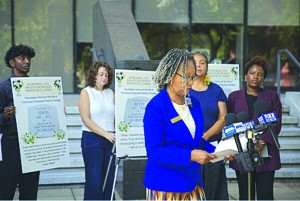14 July 2025
By Aliana Mediratta
Contributing Writer
(Veritenews.org) — Inclusive Louisiana and The Descendants Project, two environmental nonprofits based in St. James and St. John the Baptist parishes, filed a federal lawsuit on Wednesday (July 9) against Formosa Plastics, claiming that the petrochemical company is restricting community access to an antebellum grave site where five enslaved people are buried.
Taiwan-based Formosa intends to use the land, which it purchased in 2018, to build a $9.4 billion industrial complex in St. James Parish, which has garnered significant backlash from local residents who have concerns about environmental and health risks. Formosa’s land is situated along the 85-mile industrial stretch between New Orleans and Baton Rouge often referred to as “Cancer Alley” due to the increased emissions in the area that have led to increased rates of cancer and other health risks.

Barbara Washington, co-founder of Inclusive Louisiana, addresses the crowd at a press conference held on Wednesday, July 9, 2025 at the Hale Boggs Federal Building announcing a lawsuit against Formosa Plastics to gain access to a slave burial site.
Photo by Aliana Mediratta/Verite News
The lawsuit, which was announced at a press conference at the federal courthouse in New Orleans, alleges that Formosa is violating the 13th Amendment through control of the bodies of the enslaved individuals and by not allowing residents to visit the grave site. The 13th Amendment, ratified in 1865, abolished slavery. Attorneys for the plaintiff argue that the 13th Amendment bars the ownership of another human, even if that person is deceased.
At the conference, Barbara Washington, co-founder of Inclusive Louisiana, spoke about her experience as a descendant of people who were enslaved in
“In my lifetime, I have witnessed how people’s stories have been silenced, how sacred spaces have been erased, and how corporations like Formosa Plastics believe they can pave over our history as if our ancestors never existed,” Washington said. “Today I want to tell you that we will never allow that to happen.”
While Washington addressed the cameras, poster boards behind her showed photos of headstones for the five people buried on Formosa’s land, which was formerly the Buena Vista Plantation. Their names were Stanley, 31; Harry, 18; Simon, 23; Betsy, 18; and Rachel, 9.
Formosa found those remains, which were identified last year by local genealogist Lenora Gober, during a 2019 archeological survey.
Jo Banner, co-founder of The Descendants Project – which advocates for the descendants of slaves in the River Parishes – said that the lawsuit comes from a desire to be able to respect those who have died.
Over the past few years, local residents have tried to visit the site but largely been unable to due to Formosa blocking the area off, plaintiffs allege in the lawsuit. Following a court order requiring the company to grant community members access to the site for one day in February 2025, Banner and others were permitted to go to visit the burial ground. Inclement weather prevented them from driving a bus into the site, so the group had to walk a mile and a half in a downpour.
“I remember being on the site that day walking and feeling policed, monitored, being restricted, and having to endure really terrible conditions in order to simply place flowers,” Banner told Verite News. “Any other time we would have rescheduled it, so that we’d have more tolerable conditions, but there’s no choice since [the day of visitation] was ordered by a court.”
Residents have also asked Formosa for permission to place headstones at the burial site, the lawsuit says, but the company hasn’t allowed it. The remains are still unlabeled, marked only by a chain-link fence that surrounds them.
The plaintiffs are asking the court to strip Formosa of its ability to control the cemetery land and to affirm that these groups are allowed to access the graves.
They want the court to enforce their rights to access and maintain the site and help them “eradicate one of the ‘lingering vestiges of the slave system’ pursuant to the Thirteenth Amendment.”
The groups are also calling for further investigation to determine whether other burial grounds exist in the area.
Kayla Vinson, an attorney for the Center for Constitutional Rights, who is representing Inclusive Louisiana and The Descendants Project, said July 9 that it could be months or years before a resolution is reached in the lawsuit. Until then, the groups aim to continue talking about the importance of being able to access these sites.
“The fact that we can’t visit and honor our loved ones the way that others can, it shows you how much control the system of slavery still has over our lives,” Banner said to Verite.
This article originally published in the July 14, 2025 print edition of The Louisiana Weekly newspaper.